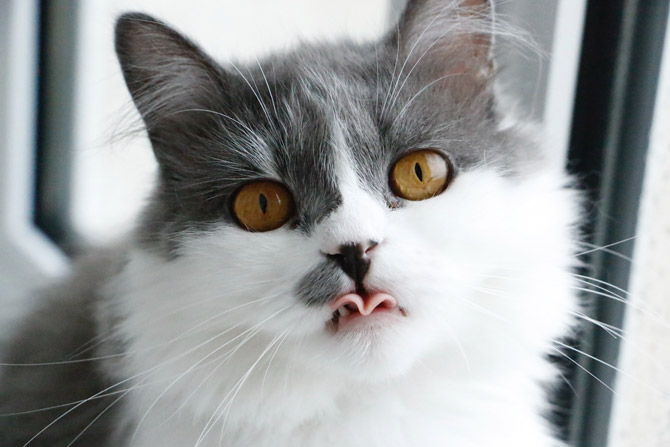By assisting your clients or customers to clue up on common cat health concerns, you’re helping our feline friends stay well.
I wonder how many of your cat-owning clients know the most popular cat health issues. Do they know that dental disease is a common problem in cats? Are they aware of the prevalence of skin issues amongst our meowing mates? Maybe not.
This is where you, as a pet professional, play a super important role. After all pet owners don’t know what they don’t know. Offering advice and education at every opportunity is a key way to help owners to become the very best pet parents.
Here are a few common cat health issues to start the conversation…
Dental decay
It’s believed that a whopping 85% of cats aged three years and older have some type of dental disease. That’s a pretty staggering statistic, don’t you think?
So, it’s not surprising that dental disease is a common condition seen by vets. In fact, the most widespread dental problems seen in cats are periodontal disease, gingivitis and tooth resorption.
Of course, while many dental issues can be addressed, if left untreated they can cause a great deal of pain for cats. Educating on some of the most common dental concerns can help owners to spot the issue early. Signs of dental decay in cats include:
- Bad breath
- Poor coat condition (suggesting an inability to groom)
- Sensitivity to hard foods
- Loss of appetite
- Weight loss
- Loose or missing teeth
- Visible signs of tartar/tooth discolouration
Skin issues
A study into cat health problems in the UK found that 10.4% of the random sample group (which involved 3,584 cats) presented with skin problems.
Common skin problems in cats include mange, ear mites, ticks and fleas, allergies and stress-induced alopecia.
Indeed, there are many other popular skin issues seen in cats. However, rather than confusing cat owners with too much information, it’s important to advise them on the signs to look out for. Common symptoms that may indicate a skin issue include:
- Incessant itching
- Loss of hair
- Dry skin
- Redness or inflammation
- Dull fur or unkempt coat
- A foul smell
- Scabs
- Excessive grooming
To assist cat owners to identify skin problems in their cats, there are a few important steps they can take. You can advise them to check their cat’s coat and skin regularly. Encourage cat owners to maintain regular vet checks. Also, it’s important they feed their cats a balanced and appropriate diet.
Furthermore, preventative pet care is a key strategy for keeping cats’ skin healthy. This includes keeping up to date with regular flea treatments, administering cat-specific supplements (if necessary) and taking action to prevent cases of self-trauma.
Digestive health concerns
Our feline friends may seem like tough little cookies, but just like us humans they too can suffer from digestive issues. Some of the most common GI-related cat health problems include gastroenteritis, constipation, colitis, diarrhoea and IBS.
So what exactly do cat owners need to know to help their fur pals steer clear of digestive disorders? Firstly, it’s important to be aware of the breeds more prone to digestive issues. This includes Rex, Ragdoll, Sphynx and Siamese. However, knowing the signs to watch for is even more useful. Symptoms include:
- Diarrhoea/constipation
- Vomiting
- Flatulence
- Regurgitation
- Weakness
- Decreased appetite
- Signs of abdominal pain (dislike of being picked up, more vocal than normal, hunched posture)
Without a doubt, the potential causes of digestive issues in cats are as long as my arm. So, perhaps break things down and pick one or two culprits to discuss each time you see a cat client.
From hairballs and toxic foods to stress and infection, you have plenty of reasons to chat to your cat-owning clients. Perhaps you could even send out a regular newsletter to educate cat owners on the myriad causes of GI issues in their meowing mates.
Promoting cat health
Of course, discussing the common issues affecting cats is all part and parcel of promoting cat health. If owners do not know the dangers, how can they take action to avoid them?
As part of your discussion, it’s really useful to offer up preventative cat health advice. For example, you can promote the importance of regular vet checks — to help spot any issues early on.
Additionally, many pet dental health issues can be avoided – if only pet owners would brush their pets’ teeth regularly.
So whether you’re a cat sitter, a vet or a cattery owner, everyone can play a role in helping to educate cat owners on ways to keep their purring pal happy and healthy.
Information sources:
- International Cat Care: Dental disease in cats: https://icatcare.org/advice/dental-disease-in-cats/
- VCA Hospitals. Dental disease in cats. https://vcahospitals.com/know-your-pet/dental-disease-in-cats
- Animal Trust UK. 11 of the most common cat skin problems: https://www.animaltrust.org.uk/blog/cat-skin-problems/
- Hill’s Pet. Digestive health in cats: https://www.hillspet.com.au/health-conditions/cat/digestive
Image source: Photo by Miron Cristina on Unsplash
Latest posts by Liz Walden (see all)
- Pet health: Medicinal cannabis for pets - December 27, 2021
- What pet business insurance do I need? - November 17, 2021
- Pet sitters: how to take time off - November 15, 2021










Leave A Comment